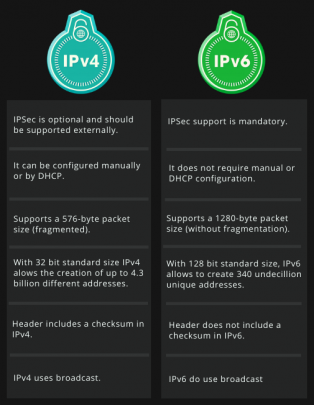The IP (Internet Protocol), created in the late 70s is the communication protocol used on the internet, and on the private networks that we see today in companies or even in homes.
It aims to enable the interconnection of two or more devices on the network.
The internet works through protocols such as IPv4 and IPv6, which are numerical combinations that establish connections between devices.
The subject of the moment, the IPv4 and IPv6 protocols still cause doubts for those who use the internet. In this article, we’ll briefly explain what they are & how the two differ in terms of security.
The IP protocol has an addressing scheme similar to phone numbers. Just like any phone in the world, it is unique (considering the area code and country code), each device connected to the internet has a unique number, which is called an IP address.
The IPv4 protocol was the first version of the IP protocol, launched at the beginning of the internet.
It is one of the main protocols based on network interconnection methods and was the first version used in the launch of ARPANET, the predecessor of the internet.
Currently, IPv4 still routes most of the world's traffic, despite the increasing implementation of the IPv6 protocol. It has addresses in the 32-bit standard and, because it is quite old, presents numerous problems, mainly in regards to its expansion capacity.
In fact, with this configuration, the IPv4 protocol allows the creation of up to 4.3 billion different addresses. This brought us to the current crisis, with the increasing expansion of the internet and the connected devices, this number is not enough.
Therefore, it is now quite difficult to find available IPv4 addresses and therefore all new devices are connecting to the network use the IPv6 protocol.
With the growing and an already expected shortage of IPv4 addresses, IPv6 is being used more and more and in a short time, it will be used in large proportions worldwide.
This is because, unlike its predecessor, it uses addresses in the standard 128 bits & allows to create 340 undecillion unique addresses. That is more than enough to sustain all worldwide traffic for quite a while.
Along with new addresses, IPv6 also offers a range of benefits for security, integrity, and performance.
It represents a major security advance since its number of addresses is so large that it makes it impossible, for example, to use IP scanning techniques in networks to find possible computers with security vulnerabilities.
Also Discover: Pros and Cons of IPv6
In IPv6, there was also a concern to correct the security limitations existing in IPv4. One of the main mechanisms created for this is IPSec (IP Security), which provides data packet encryption features, in order to guarantee three aspects of these: integrity, confidentiality, and authenticity.
In fact, IPSec can also be used in IPv4, but not in NAT-based communication. There is no need for the latter in IPv6, so the use of IPSec occurs without limitations.
To perform its function, IPSec essentially uses an extension header called the authentication header for authentication purposes, another called the Encapsulating Security Payload (ESP) to guarantee confidentiality, and the Internet Key Exchange (IKE) protocol for encryption.
It is worth noting that the IPv6 protocol, by itself, already represents a major security advance, since its number of addresses is huge.
For example, it makes it impossible to use IP scanning techniques in networks to find possible computers with security vulnerabilities.
It is important to note, however, that the fact that IPv6 offers more protection than IPv4 does not mean that reducing security concerns will not cause problems.
An access control system, a firewall, antivirus, and other resources must continue to be applied.
You may also like to read: Top 11 Network Configuration Management Tools





